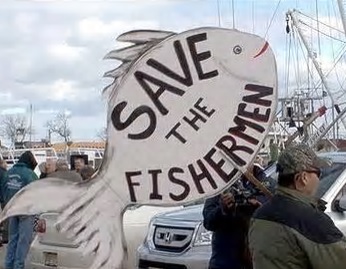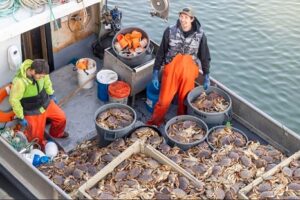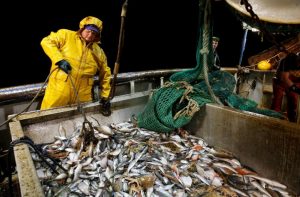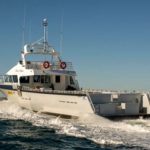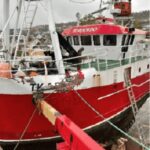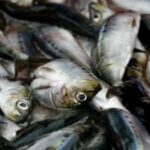Tag Archives: MSA

Managing A Lucrative Resource In The Face Of Climate Change
Conservationists and commercial fishing industry leaders came together on the need to restructure the Magnuson-Stevens Fishery Conservation and Management Act to adequately consider climate impacts during a panel discussion in Honolulu. But that was about it for the common ground they found during the last stop on U.S. Rep. Jared Huffman’s nationwide “listening tour” on reforming the MSA. The panelists, which also included state and federal officials, had diverging views on the effectiveness of marine national monuments like Papahanaumokuakea and whether the eight regional councils that the law set up to manage fishery resources nationally should have designated seats to ensure representation from environmental, indigenous and scientific interests as well as the commercial fishing industry. >click to read< 10:38
What ever happened to HR-200? I have no interest in these people reauthorizing anything.
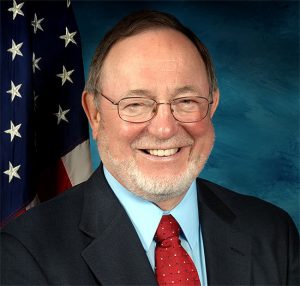
Rep. Young fights fish farms
In his 46 years as Alaska’s lone representative in Congress, Don Young helped toss out foreign fishing fleets from Alaska waters with the onset of the Magnuson-Stevens Fishery Conservation and Management Act in 1976, and today he is intent on doing the same with offshore fish farms. The MSA established an ‘exclusive economic zone’ for US fleets fishing from three to 200 miles from shore. Young’s effort follows a push that began a year ago by over 120 aquaculture and food-related industries to have lawmakers introduce an Advancing the Quality and Understanding of American Aquaculture (AQUAA) Act, which failed to get any traction. The campaign is organized under a new trade group called Stronger America Through Seafood and includes Cargill, Red Lobster, Pacific Seafoods and Seattle Fish Company. >click to read<15:50
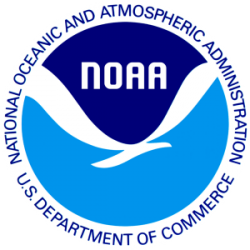
2017 Report to Congress on the Status of U.S. Fisheries
NOAA Fisheries NMFS is pleased to present the 2017 Report to Congress on the Status of U.S. Fisheries managed under the science-based framework established by the Magnuson-Stevens Fishery Conservation and Management Act (MSA). The 2017 report highlights the work toward the goal of maximizing fishing opportunities while ensuring the sustainability of fisheries and fishing communities. Due to the combined efforts of NOAA Fisheries, the eight regional fishery management councils, and other partners, three previously overfished stocks were rebuilt and the number of stocks listed as overfished is at a new all-time low. >click to read<16:04
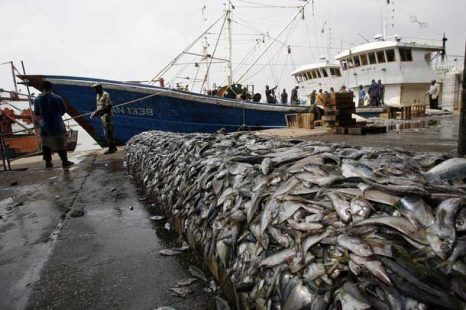
Fish Stocks And Our Balance Of Payments
Our balance of payments is overly burdened by our consumption of seafood: We import approximately 90% of the seafood that we eat. Given our natural resources, we should be net exporters of seafood. The total value of edible and non-edible fishery imports in the United States was $35.8 billion in 2016. The total value of edible and non-edible exports was $21.3 billion. The imbalance does not imply only a shipment of dollars abroad. It also implies a number of jobs exported, a number of jobs that could be created in this country, were we not to import that much more seafood than we export.,,, The reason for the imbalance in our accounts with other nations is not due to lack of fish in our waters. Not to put too fine a point on it, the imbalance is due to rules and regulations imposed by our National Marine Fisheries Service (NMFS) that prevent our fishermen from catching fish. click here to read the article by Carmine Gorga 09:21
North Pacific Fishery Management Council seeks to reduce veto threat over MSA — but not during its meeting in Sitka.
 Council members have concerns over amendments that would exempt fisheries decisions from the National Environmental Policy Act, and open the door to potentially biased science. (but, we already have NOAA’s “best available” science!) The final recommendations from the council on changes to the Magnuson Stevens Act won’t be made until another committee — the CCC, or Council Coordination Committee — meets later this month. Read the rest here 13:58
Council members have concerns over amendments that would exempt fisheries decisions from the National Environmental Policy Act, and open the door to potentially biased science. (but, we already have NOAA’s “best available” science!) The final recommendations from the council on changes to the Magnuson Stevens Act won’t be made until another committee — the CCC, or Council Coordination Committee — meets later this month. Read the rest here 13:58
House committee takes up fisheries bill today
 The U.S. House Committee on Natural Resources will take up a bill Thursday that could potentially change the way fisheries are managed in the U.S. through an amendment to the Magnuson-Stevens Fishery Conservation and Management Act. Yes. For the better! “We’ve been working for seven years to get some flexibility in the Magnuson-Stevens Act,” (Pam) Anderson said. “It’s desperately needed.” Read the rest here 08:08
The U.S. House Committee on Natural Resources will take up a bill Thursday that could potentially change the way fisheries are managed in the U.S. through an amendment to the Magnuson-Stevens Fishery Conservation and Management Act. Yes. For the better! “We’ve been working for seven years to get some flexibility in the Magnuson-Stevens Act,” (Pam) Anderson said. “It’s desperately needed.” Read the rest here 08:08
Half of Hawaii’s Bottomfishing Restricted Areas Opening Up
 A long-simmering dispute over the state’s Bottomfishing Restricted Areas (BRFA’s) between Hawaii’s fishing community and the state’s and fisheries scientists has resulted in a move by the state to open six BRFAs and keep six BRFAs closed. Read more here 17:45
A long-simmering dispute over the state’s Bottomfishing Restricted Areas (BRFA’s) between Hawaii’s fishing community and the state’s and fisheries scientists has resulted in a move by the state to open six BRFAs and keep six BRFAs closed. Read more here 17:45
Fishermen file suit over salmon management
United Cook Inlet Drift Association and Cook Inlet Fishermen’s Fund filed suit in District of Columbia District Court Jan. 18 over the transfer of salmon management from federal authorities to the state of Alaska.






